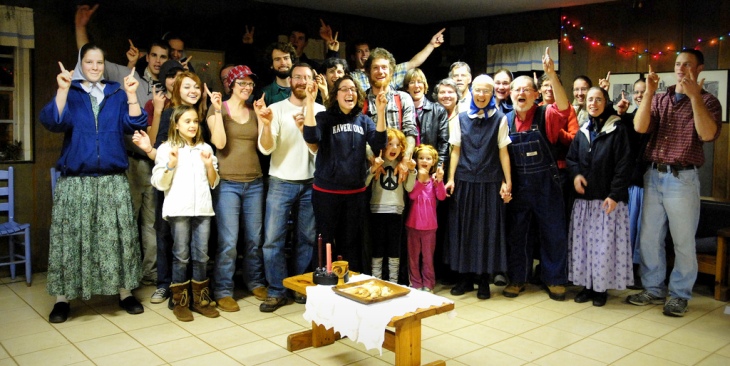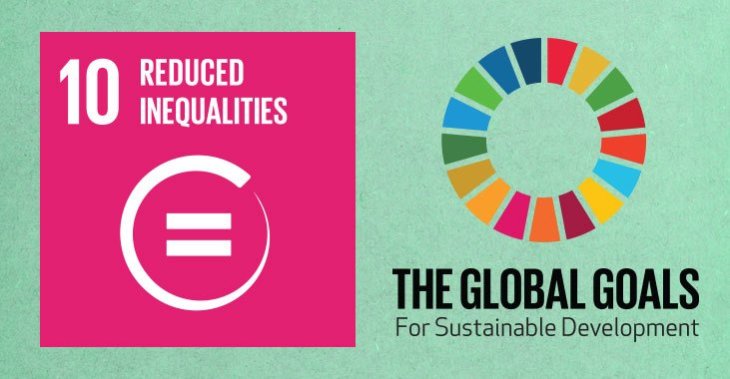Home » Posts tagged 'Poverty' (Page 2)
Tag Archives: Poverty
Obstacles and Opportunities for a Christian Community Revolution

Half a year ago I cofounded an association here in Sweden called the Jerusalem Project, which promotes Christian community life and aspires to make community of goods like in the book of Acts more common in the churches. I and the others in the board have been planning for some months to start an intentional community if our own next year, and as a preparation we follow a common rule that outlines a simple lifestyle, prayer routines, Bible reading and ethics. We also read The Intentional Christian Community Handbook by David Janzen together and discuss it over Skype.
In Janzen’s book, Brandon Rhodes has contributed with some great chapters on how modern culture impacts the prospects for increasing Christian community life. In the West, people are more individualistic than they used to be, which is both an obstacle to community since such a life is very communal, as well as an opportunity since it may stir a longing for an alternative social way of living.
Rhodes also point out that more people than ever before come from divorced families, that the line between youth and adulthood has been completely blurred, and the fact that people are online more than ever. These things, and many more, pose challenges to community life that need to be taken seriously. (more…)
7 Reasons You Shouldn’t Wear Expensive Clothes
Prepare to be uncomfortable.
I wrote three years ago about how absurd it is that Christians often are expected to “dress up” as they attend church meetings, wearing clothing that’s more expensive and “proper” than what they normally wear. The reason this is absurd is that the Bible never commands it – on the contrary, it prohibits Christians to wear expensive clothes at all times, not just on church meetings. I’ve made a video when I discuss this:
The New Testament particularly addresses Christian women, telling them to not wear jewelry or expensive clothing:
“I also want the women to dress modestly, with decency and propriety, adorning themselves, not with elaborate hairstyles or gold or pearls or expensive clothes, but with good deeds, appropriate for women who profess to worship God.” (1 Tim 2:9-10)
“Your beauty should not come from outward adornment, such as elaborate hairstyles and the wearing of gold jewelry or fine clothes.” (1 Peter 3:3)
Song: Welcome
The World is often a hostile place, but Jesus is constantly welcoming and commands us to be hospitable. This song is written and sung by me, guitar by Andreas Lundström.
Welcome homeless people, welcome to my house
It’s warm inside and I got food and I’ll never kick you out
I’m sorry that my countrymen just let you starve and freeze
The world outside is hostile but you’re welcome to me
I bid you welcome, welcome, welcome to me
I love you and I want you here so please come to me
Welcome refugees, bring your families
Welcome to my country where there’s welfare and peace
I’m sorry that the racists promote inequality
But I will fight for your right to stay ’cause you mean a lot to me
I bid you welcome, welcome, welcome to me
I love you and I want you here so please come to me
Welcome unbelievers, welcome to our church
We offer healing, eternal life and a bunch of other stuff
We’re sorry that we Christians often behaved like piles of sh*t
But Jesus rocks and His Spirit rules so please pay us a visit
We bid you welcome, welcome, welcome to us
We love you and we want you here so please come to us
Welcome Holy Spirit, welcome to my heart
I need your power, strength and love, ‘less I’ll just fall apart
I’m sorry for my egoism and sinful lusts and deeds
I want to serve like Jesus so please, Spirit, wash me clean
I bid you welcome, welcome, welcome to me
I love you and I want you here so please come to me
Welcome my beloved, says almighty God
Welcome to my Kingdom that awaits you in the clouds
You won’t feel sorry any more when I wash away your tears
You’ll be with Me forever, no more days or months or years
I bid you welcome, welcome, welcome to me
I love you and I want you here so please come to me
Why the Prosperity Preaching at Bethel Church is a Huge Problem
Kris Vallotton at Bethel Church recently held a sermon called “Poverty, Riches and Wealth” which is nothing less than pure, economic prosperity preaching. His conclusions are basically that all Christians with some few exceptions should be rich and that wealth isn’t a problem as long as it multiplies and grows exponentially. In this video I respond to his arguments and show why they don’t work:
As you may know, I’ve argued that Christians should not be rich in my God vs Wealth series and I recently did a Holy Hangout on prosperity theology with some friends where I criticized the “health and wealth gospel” for being unbiblical and hurtful.
Now, some people have told me that Vallotton’s position actually is “balanced” and even close to my own, that he’s not that off after all. I strongly disagree. I was surprised to hear how radical his prosperity thinking was and how deliberately he ignored or distorted relevant Bible passages.
Vallotton starts off in 1 Tim 6, arguing that love of money isn’t the root to all evil but a root to some evil (the text actually says a root to all evil). He does not mention verses 5-9 at all, probably because they crush all forms of economic prosperity theology. Verse 5 talk about “people of corrupt mind, who have been robbed of the truth and who think that godliness is a means to financial gain.” (more…)
Holy Hangout: Prosperity Theology
Does a strong faith in God lead to a prosperous life filled with health and wealth? Since the 1950’s, several Pentecostal and charismatic preachers have been arguing that followers of Jesus should be rich and successful. Oftentimes, they have put their teachings into practice by possessing expensive jet planes and huge mansions.
In this Holy Hangout I talk with design student and Vineyarder Friederike Berghauer from Germany and former Vineyard pastor and blogger Joshua Hopping from the United States. We discuss what prosperity really is, the historical roots to why “Health and Wealth” teaching originated, why it’s popular in Latin America and Africa, Biblical texts that challenge traditional prosperity teaching and the role of contentment and suffering in a Christian’s life.
If you have a suggestion on a topic for a future Hangout and/or want to join, just contact me!
How Should Community of Goods Be Organized?

Maranata Community in Stockholm
How was Christian community of goods practically organized in the time of the Bible and how should it be organized today?
There are many myths and misconceptions about the apostolic church in Jerusalem and its community of goods. I’ve encountered people who think that all the disciples became homeless and unemployed as “those who owned land or houses sold them” (Acts 4:34), so that community of goods was more about having nothing in common rather than everything in common. In reality, however, they bought new houses after the resources were redistributed equally (8:3). Likewise, they probably bought new land and/or got other sources of income than agriculture.
The reason for doing this was most likely the fact that some people lived in quite luxurious homes while others were living in poor homes or even on the street. Selling everything and collecting the money in one pile under the oversight of the apostles made it possible for the church to provide a descent living for everybody, so that “there were no needy persons among them.” (4:34).
Now, we must remember that in the time of the New Testament there were no bank accounts. Everyone got paid in cash when they received their salary. This meant that even after the initial Great Selling of Everything, Christians in Jerusalem would receive their income individually (and most women, children and disabled people would not have any income at all). (more…)
Jets vs Jesus

A Cessna 550b, one of Copeland’s jets according to the Christian Post.
So it’s no secret that several American prosperity preachers are ridiculously rich. When I’m out speaking about the importance of combining signs and wonders with simplicity and community of goods, my favourite bad example is charismatic Word of Faith leader Kenneth Copeland, who owns a mansion worth six million dollars, two private jets and his own airport, the Kenneth Copeland Airport, where he keeps his jets close to his million-dollar mansion. Most of his money is from ordinary people, who donate thinking that they’re doing something good for God’s Kingdom and that God will bless them with riches as well.
In a recent video, Copeland and Jesse Duplantis give some horrible reasons for why they “need” their luxurious jet planes: they need to stand up and pray, avoid people who want them to pray for them and who are filled with demons, sleep on the plane and travel long distances across America basically every single day. Now, you can stand up and pray on a commercial airline, or sit doing it; ministering to people is obviously a good thing and if you tired just tell them; and rather than spending millions of dollars on these pieces of luxury, I think it would be healthy for these men to travel less and sleep in normal beds more often.
Not only are private jets incredibly expensive when you buy them, but as J. Lee Grady has pointed out, maintenance costs about four million dollars per year, and a flight costs about 100 times more compared to using a normal plane. Flying is very harmful to the environment, and that harm increases enormously when using a private jet instead of a plane that many people fit into; just like buses are better for God’s creation than cars.
How Can We Worship One Refugee and Despise Another?

José y Maria. Amazing image by Everett Patterson
I don’t know if you’ve noticed but there’s been a lot of hostility towards refugees in the minority (so called “Western”) world lately. In Europe, country after country are closing their borders and argue that they don’t have capacity and resources to welcome refugees, even though the EU is the world’s richest political entity and development countries receive 86 % of the world’s refugees. In Australia the government is pushing back boats of refugees and put refugees in horrible detention camps, and in the United States there’s a guy called Trump who wants to ban Muslims from entering the country and build a wall against Mexico.
The two latter examples are extremely confusing since the white population there are obviously descendants of immigrants themselves… I read in Bob Ekblad’s book A New Christian Manifesto recently about some Scandinavian Americans who were protesting against native Americans’ claims of land, and the Scandinavians’ argument were that they had owned that land for such a long time.
The Bible says: “The foreigner residing among you must be treated as your native-born. Love them as yourself, for you were foreigners in Egypt.” (Lev 19:34). The Israelites had then been in Egypt for 400 years. Most American and Australian families have lived in their colonies for less than that, which means that they surely are immigrants from God’s perspective, and this Bible passage is naturally very relevant to them. They have no moral grounds for deporting immigrants when they are rich and themselves have benefited from migration. (more…)
All the Reasons for Why Christians Shouldn’t Be Rich
Mammonism, the idea that it’s OK for Christians to accumulate and possess wealth, has brought too many saints into ruin and destruction. This teaching kills poor people, as well as corrupts the sanctification process of the rich. Mammon, Wealth, is an enemy to God and it’s really important that we strive for simplicity and equality instead of trying to be as rich as possible.
I have been talking a lot about this in my God vs Wealth Youtube series, and I’ve written about it in my e-book God vs Inequality, but I still felt the need to gather all arguments I have for why Christians shouldn’t be rich in one lecture. It’s one hour long, and you can watch it right here:
In the video I discuss Jesus’ and the apostles’ teaching on wealth and poverty, the wealth of patriarchs and kings in the Old Testament and why it’s not normative for Christians, the woman and the alabaster jar, prosperity theology, and much more. I pray that this will equip God’s people to promote simplicity and equality even more.
Why Wealth is Wrong: The Moral Argument

Let us end our little blog series on why wealth is wrong. We have already looked at the mathematical argument, where we saw that it is impossible to keep wealth while giving the same wealth to the poor. Then we discussed the economic argument, which says that it is better to invest in goods and services beneficial for the poor rather than superfluities like luxury and entertainment. And last time, I brought up the Bill Gates argument, which states that it is the quantity of what we keep, rather than what we give away, that measures our generosity.
In each post we have started with an argument for why wealth is right, and we shall do the same in this post. The most common moral argument I hear when people defend wealth is: “Rich people have worked hard for their wealth, and deserve therefore to have it and do what they please with it.” It is often combined with “We only have a moral obligation for ourselves and our families, not for the entire world.”
The moral argument for why wealth is wrong, on the other hand, is brilliantly summarized by the apostle John: “If anyone has material possessions and sees a brother or sister in need but has no pity on them, how can the love of God be in that person?” As I explained in my article about a Christian World Vision, Jesus-followers should without doubt apply the same moralic standpoint on non-believers as well. (more…)
Wealth Kills the Church
Jesus calls wealth “deceptive” and said that it stifles the obedience to the word of God like thorns (Matthew 13:22). Paul says that we should be content with food and clothing and says that those who want to get rich fall into temptation and snares, which throws men into destruction and perdition (1 Timothy 6: 8-9). James takes an even harsher view: “Listen, you rich, weep and howl for all miseries that shall come upon you. Your riches will rot and your clothes devoured by moths. “(James 5: 1-2) Even Jesus lamenented the rich, while he praised the poor as blessed (Luke 6: 20-24).
The more money and gadgets wealthy people keep for themselves, the less they give to the poor by definition. You can not spend a hundred on makeup while providing the same hundred to a humanitarian organization. The Apostle John writes: “If anyone has earthly possessions and sees his brother in need, yet closes his heart against him, how does God’s love abide in him?” (1 John 3:17). John the Baptist proclaimed: “Whoever has two tunics should share with the one that has none, and he who has food should do likewise.” (Luke 3:11)
How does the rich Christian relate to the Bible’s radical teaching on wealth control and economic equality? Many do not feel particularly comfortable with it and try to find theological justifications why they can nevertheless be rich. An example of this is the prosperity theology, “Health and Wealth” – message, which says that Christians not only can but should be rich as a result of a strong faith. My impression is that this theology is rarer today than, for example in the 1980s, and that most Christians now agree with St. Paul that prosperity preachers “have lost the truth when they say that fear of God should lead to pofitability.” (1 Timothy 6: 5). (more…)
The Bruderhof on Why Community of Goods is for Everyone
The Bruderhof is a radical, Anabaptist Christian movement that has practiced community of goods since the 1920’s. Founded in Germany, it had to flee Hitler going to Paraguay, the US and England, although new communities around the world are emerging. Their website and YouTube channel is packed with inspiration and teaching on community of goods, and I found this article by Charles E. Moore to be a brilliant apology of why all Christians should have everything in common. Here’s an excerpt:
Peter does not tell Ananias that he could have come into the Christian community without renouncing the private ownership of his goods. How could he, when Luke wrote that “not a single one said anything was his own” (Acts 4:32) and that “whoever possessed fields or houses sold them,” and that “all the faithful together had everything in common” (Acts 2:44), and so on? Didn’t Jesus say to the crowds, “Every one of you who does not renounce all he has cannot be my disciple” (Luke 14:33). Ananias’ sin was that he pretended be a Christian via a counterfeit renunciation. This is why his sin was dealt with so severely. The entire thrust of both Luke and Acts is that those who follow Jesus freely give up everything.
Read the rest of the article here.
A Christian World Vision
I often debate with fellow Christians who, contrary to me, oppose migration from poor countries to rich countries, aid from rich countries to poor countries or that rich countries should take greater responsibility for the environment than poor countries by living simpler. When I argue for why I think these ideas are good, I often point to facts and statistics that for example show that poor countries receive 80 % of all refugees today, or that aid donations are less than 0.3 % of rich countries’ GDP, or that environmental pollution kill more people today than malaria and HIV. Quite often I even have to start with explaining that rich countries are rich; most xenophobic people here in Sweden think that Sweden isn’t a rich country, which of course is the opposite of what the Global Wealth Report recently stated.
However, while I believe these facts are important for the discussion, they are seldom sufficient for my adversaries to change their mind. I find over and over again that even if we can agree upon that the world is unequal and unfair, they don’t have a problem with that while I certainly do. We have different world visions, and they often tell me that I shouldn’t claim that my world vision is more Christian then theirs.
But it is.
Jesus’ ethical teaching is clear and straightforward. Do to others what you would have them do to you (Mt 7:12). That’s a universal command, meaning it applies to all human beings. We should love everyone, even our enemies, and do good to them just as the Father loves and does good to all human beings (Mt 5:43-48). (more…)
Why Wealth is Wrong: The Bill Gates Argument
When (rich) Christians defend mammonism, the idea that Christians may or should be rich, they often include arguments that aren’t necessarily based on Bible study – such as the arguments I discuss in my God vs Wealth series – but rather in philosophy or economics. These are the sorts of arguments I tackle in my Why Wealth is Wrong series. You can also read my discussions on the economic argument and the mathematical argument.
The Bill Gates argument for why it’s OK to be rich is a variant of the mathematical argument that involves billionaires. Look at Bill Gates, the mammonist says, he’s so generous! He has his Bill and Melinda Gates Foundation that does so much good for the world’s poor. This is because Gates is the richest man in the world, with his net worth of 75 billion US dollars. His abundant wealth allows him to be abundantly generous, and thus he as a rich man should not be condemned but celebrated both for his skills in computer invention and business, and his philanthropy.
The problem with the argument is that it tries to eat the cake and give it away at the same time: wealth is good, because you can give it away. This is the same error as the mathematical argument makes. Saying that wealth is good because billionaires can give lots of money to the poor, is like saying that it’s good to be fat because then you can lose a lot of weight. It’s trying to rationalize a phenomena by arguing that you can get away from it. (more…)
Did Jesus Say that Poverty Will Never be Eliminated?
Today is a historic day, the United Nations General Assembly adopted the Global Goals for sustainable development just a few hours ago. These goals are sort of a sequel to the Millennium Development Goals (MDGs) which has been surprisingly successful in making the world a better place: extreme poverty has been cut in half, hunger too, more children go to school, less women and babies die in childbirth, and people live longer. Praise God! John Green, educated Youtuber and a Christian, explains briefly the achievements of the MDGs in this video:
The Global Goals step things up a bit though; the new ambition is to totally eliminate extreme poverty by 2030 and also make sure that nobody goes hungry. Other goals (there are 17 of them) include global gender equality with no more discrimination against women anywhere, reduced economic inequality, reasonable consumption, action against climate change and environmental pollution, etc.
Should Christians support the Global Goals? Duh, obviously. Helping the poor and caring for God’s creation is extremely Biblical, isn’t it? Well, some brothers and sisters do object against the goals in general and the first one about ending poverty in particular. The general critique against goals like this is that we should not imagine ourselves being able to turn this world into a paradise, since all men are sinful (Rom 3:23) and the Kingdom of God is not of this world (Jn 18:34). The particular critique against the idea of ending poverty is that Jesus actually said:
The poor you will always have with you, and you can help them any time you want. But you will not always have me. (Mark 14:7)











